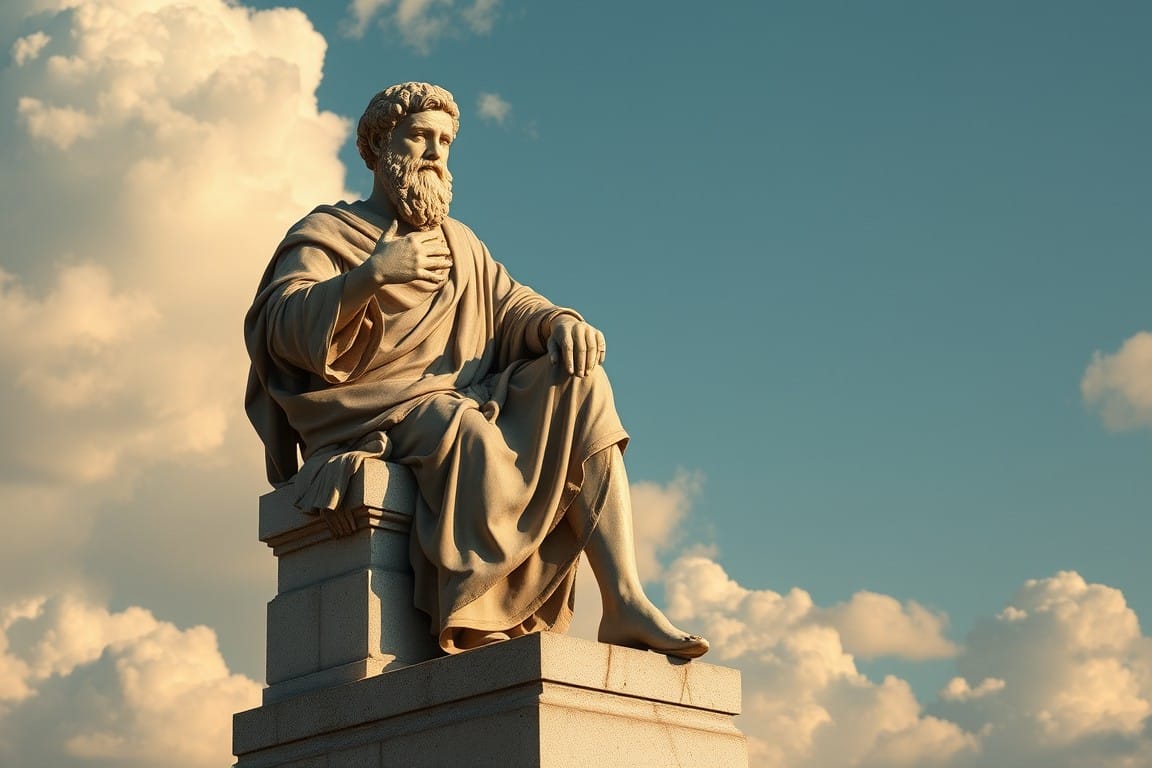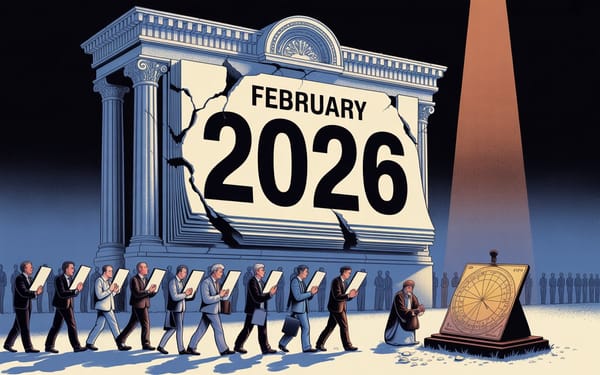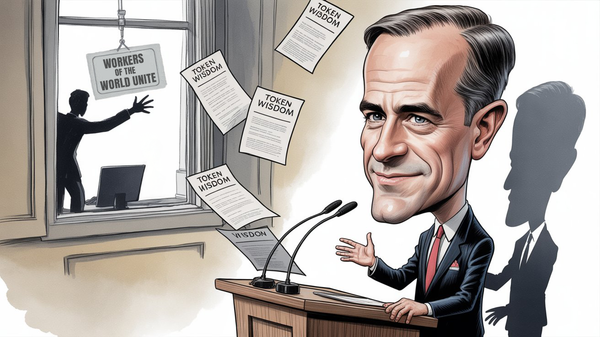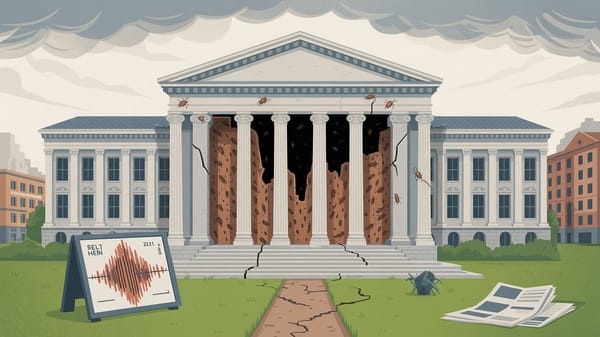

We are what we repeatedly do. Excellence then is not an act but a habit.
From Ancient Agora to Digital Arena: Decoding the Timeless Power of Ethos, Pathos, and Logos
Now begins a story. You’re facing a crowd, shaking with adrenaline, anxious but determined. You’re on the spot and only have one chance to convince them, change their minds, and inspire action. What do you do? What’s your strategy? If you're smart, you channel your inner Aristotle.
Aristotle's ancient communication model remains pivotal in our modern world. Despite the passage of over two millennia, his principles continue to shape effective public speaking, marketing, and persuasive messaging across various platforms. From viral TED Talks to career-defining political debates, Aristotle's principles of rhetoric still shape effective communication. Have you been on the internet lately? It’s all soundbites and fleeting trends that capture our attention, these ancient tenets still serve as the lighthouse, guiding us through the turbulent seas of this modern discourse.
In our hyper-connected era, where algorithms curate our reality and attention spans shrink to the size of a tweet, Aristotle's ancient wisdom stands as a towering lighthouse amid a sea of digital chaos. His rhetorical triad—ethos, pathos, and logos—isn't some arcane academic concept gathering dust in university libraries. It's more like a master key, unlocking the secrets of persuasion across platforms, from boardrooms to viral TikToks. While we're bombarded with an endless barrage of information, these timeless principles cut through the noise, offering a framework for crafting messages that resonate on a deeply human level.
This essay argues that Aristotle's model isn't just hanging around because it's old; it's still kicking because it bridges the gap between our human nature and our increasingly digital lives. While algorithms try to sort us into neat little boxes of opinion, Aristotle's approach reminds us that persuasion is an art that speaks to our whole selves—head, heart, and gut.
By examining how these classical principles adapt and thrive across diverse contemporary contexts—from viral marketing campaigns to global diplomacy—we uncover their transformative potential in fostering authentic engagement and critical thinking in an age of information saturation. Besides, this exploration reveals how Aristotle's framework, when skillfully applied, can serve as a bulwark against the rising tide of misinformation, providing a timeless toolkit for discerning truth in a post-truth world. Like a three-legged stool, each component is vital for a stable argument. Remove any the, and the entire structure becomes unstable.
The Top Articles of the Week
100% Humanly Curated Collection of Curious Content
First up, we've got ethos – the credibility factor. Think about it: who would you trust more for medical advice? A doctor in a white coat or some random person handing out flyers on the street corner? It's all about perception and expertise. As Aristotle argued in his 'Rhetoric', ethos is 'the most effective means of persuasion' (Aristotle, trans. 1954).
This isn't just true in medicine. Look at how companies use celebrity endorsements. Take Serena Williams, for example. When she backs a tennis racket, people listen. Why? Because she's Serena Williams! Her years of dominating the tennis world give her words weight. When she says a racket is good, tennis fans believe it.
This credibility thing? It's everywhere. Credibility distinguishes industry leaders from average contributors. In today's opinion-saturated world, being a recognized expert can be a game-changer.
While establishing trust is essential, it's just the beginning of truly compelling communication. To captivate listeners, speakers must tap into something deeper - the realm of feelings and sentiment. This is where the power of emotional appeal comes into play, breathing life into persuasive discourse. Stirring the heart can be as potent as convincing the mind. By weaving emotive elements into their words, orators transform dry rhetoric into moving oratory.
While logic forms the backbone of persuasion, emotion breathes life into it. A skilled communicator blends logic and emotion to create a compelling message. Like a master storyteller, they can evoke a range of feelings using carefully chosen words. This emotional connection elevates a presentation from merely informative to truly memorable, demonstrating the power of pathos.
The true power of pathos is the transformation of dry facts into engaging stories. A single, well-told anecdote often resonates more than numerous statistics. When logic alone fails to inspire, emotional appeals can motivate action. Pathos provides the emotional current that elevates a straightforward argument into a stirring discourse, bridging the gap between understanding and feeling. Modern research supports Aristotle's emphasis on emotional appeal. Damasio (1994) showed emotions are crucial for sound decision-making. This is particularly evident in the effectiveness of emotional appeals in charity fundraising.
Consider, for instance, organizations advocating for animal welfare. Their campaigns often use emotional appeals, featuring touching images or stories. These elements evoke strong feelings in viewers, motivating them to act or donate. In this way, pathos serves as a catalyst, transforming sympathy into tangible support.
The political arena offers another fertile ground for the application of pathos. Political figures often use personal stories and humble origins to connect emotionally with voters, making themselves more relatable. These strategies serve to humanize the politician, rendering them more relatable and their message more impactful. By forging an emotional connection, they create a bridge of empathy between themselves and their audience.
Pathos transforms dry facts into compelling stories. It adds emotional depth, making information not only understood but deeply felt. This emotional connection is crucial for keeping audiences engaged, ensuring messages resonate both intellectually and emotionally. In persuasive communication, pathos is not just an add-on to logic but an essential element.
Reason and evidence form the foundation of Aristotle's third rhetorical element: logos. This crucial component relies on presenting solid facts, measurable information, and incontrovertible proof to strengthen an argument. Logos explains why mere assertions, even from respected sources, often fail to change minds. In contrast, carefully built cases supported by concrete evidence tend to leave a lasting impression.
Skilled debaters use statistics, expert opinions, and historical examples to strengthen their arguments. This strategy not only informs but also persuades by appealing to logic. It's the difference between saying "Trust me, this works" and demonstrating why and how it works through verifiable means. In 'The Art of Rhetoric', Aristotle posited that logical arguments should be 'demonstrative and ethical' (Aristotle, trans. 1991).
In science, logical reasoning is paramount. Researchers support their discoveries with detailed methods, data, and peer review, ensuring credibility through rigorous proof. This approach extends to everyday life. Parents who explain the reasoning behind rules often find more success than those relying solely on authority.
For example, when discussing healthy eating with children, explaining the benefits of a balanced diet is more effective than imposing arbitrary rules. This method uses logical appeal, grounding arguments in scientific understanding, which is more persuasive to both parents and children. In the sphere of commercial promotion, the persistent popularity of terminologies such as "laboratory-verified" or "research-backed" in product endorsements underscores the enduring significance of logos in contemporary persuasive strategies. These phrases tap into the consumer's desire for empirical validation, illustrating how logical appeal remains a potent force in shaping public opinion and consumer behavior.
The efficacy of logos extends beyond mere fact-stating; it involves the artful weaving of these facts into a coherent narrative that appeals to the audience's intellect. By doing so, the speaker not only informs but also empowers the listener, fostering a sense of rational decision-making that can be more enduring than appeals based solely on emotion or authority.

Ancient Greek rhetoric may seem irrelevant to today's digital world. Yet, Aristotle's model remains surprisingly applicable to modern communication, even in social media stories. Let's examine how these enduring principles continue to influence our digital interactions.
Aristotle's principles of ethos, pathos, and logos are essential persuasion tools in modern corporate strategy. For example, when Apple launches a new iPhone, they employ:
- Ethos: Highlighting their history of innovation
- Pathos: Emphasizing how the product will improve your life
- Logos: Presenting impressive technical specifications This approach aims to convince consumers to upgrade, even if their current de
In corporate crisis management, Aristotle's rhetorical model proves invaluable. Consider an airline facing backlash for forcibly removing passengers from overbooked flights. The CEO would employ:
- Ethos: Establish credibility by accepting responsibility.
- Pathos: Express sincere remorse and empathy for affected customers.
- Logos: Present a rational plan to rectify the situation and prevent future occurrences.
This strategy blends responsibility, empathy, and reason to minimize harm to reputation.
Another example of Aristotle's rhetorical principles remains evident in modern oratory, exemplified by Barack Obama's 2008 Democratic National Convention speech. Obama effectively used the three pillars of persuasion:
- Ethos: Established credibility through personal history and political experience.
- Pathos: Connected emotionally by linking his story to the American dream.
- Logos: Supported arguments with policy proposals and economic data.
Obama didn't just give a speech - he put on a masterclass in persuasion. By blending Aristotle's ancient wisdom with his own modern charisma, he turned political rhetoric into something that felt almost like art. It wasn't just Democrats nodding along; people across the board found themselves drawn in.
Obama's secret sauce? He mixed credibility, emotion, and logic so smoothly that you hardly noticed the recipe. But the result was powerful. Not only did it help win him the election, but it also got Americans excited about political speech again. Who knew centuries-old techniques could still pack such a punch in the age of Twitter and 24-hour news?
Even in the fast-paced world of social media, Aristotle's principles remain relevant in modern social media, as exemplified by Neil deGrasse Tyson's Twitter account. He builds trust through consistent, quality posts. His knack for simplifying complex astronomy into bite-sized tweets showcases both expertise and passion. This blend of logic and enthusiasm has earned Tyson a massive following, cementing his role as a digital-age science communicator.
This Aristotelian rhetoric model offers a versatile framework for effective communication in various settings, extending beyond mere persuasion.
A pediatrician addressing vaccine-hesitant parents could:
- Establish ethos by presenting their medical credentials and experience.
- Appeal to pathos by empathizing with parental concerns and sharing success stories.
- Use logos by citing peer-reviewed studies on vaccine safety and efficacy.
Aristotle's principles offer practical solutions to complex real-world problems. As Higgins and Walker (2012) demonstrate in their analysis of corporate social responsibility reports, Aristotle's rhetorical strategies remain relevant in contemporary business communication.
However, no model is without its detractors. Critics argue that Aristotle's approach is excessively speaker-centric, failing to account for the dynamic, interactive nature of modern communication. Others contend that it neglects the concept of "noise" – those myriad distractions that can obfuscate one's message. In our globalized, multicultural world, the model's lack of explicit consideration for cultural context presents a notable limitation. Scholars like Lunsford and Ede (1984) have argued for a more audience-centered approach to rhetoric, expanding on Aristotle's speaker-focused model.
These critiques, while valid, do not negate the model's intrinsic value. These ideas build on Aristotle's foundation, encouraging adaptation and expansion. Like transportation's evolution, the core function remains, but methods advance to meet modern demands.
Real-time audience feedback allows speakers to instantly adjust their communication strategies. For example, during a live-streamed product launch, a tech company can analyze social media reactions to refine their messaging immediately. This dynamic approach allows for a more nuanced and effective application of Aristotle's principles in a digital context.
Regarding cultural context, this presents an opportunity to deepen our understanding and application of Aristotle's model. What constitutes ethos can vary significantly across cultures – for example, in some Asian cultures, humility and collective achievement may be more persuasive than individual accomplishments. A show of emotion that builds pathos in one culture might be perceived as a lack of professionalism in another. Adapting Aristotle's model to our diverse, interconnected world enhances rather than abandons it.
In today's complex world, we face several key challenges:
- Artificial intelligence raises new ethical questions.
- Climate change requires urgent, collective action.
- Social justice movements are reshaping society.
- Global health crises highlight our interconnectedness and vulnerabilities.
These issues demand our attention and innovative solutions.
Clear communication is crucial in facing these challenges. It is in this context that we find Aristotle's rhetorical principles not consigned to the dusty shelves of antiquity, but standing as a beacon of clarity in our age of information saturation. These ancient tenets serve as a lodestar, guiding us through the labyrinthine corridors of modern discourse, where truth and misinformation often wear indistinguishable masks. Our journey through the modern landscape has revealed the pervasive influence of ethos, pathos, and logos across diverse domains. From boardrooms to virtual platforms, from political podiums to grassroots campaigns, these ancient pillars continue to buttress the architecture of persuasion.
Ethos, once the domain of titles and pedigrees, now shape-shifts in our digital age. Entrepreneurs, journalists, and data scientists are transforming industries and society in our rapidly changing world. Their bold ideas and groundbreaking work attract investors, outpace traditional media, and shape policy decisions. As trust becomes increasingly fragile, credibility has emerged as a valuable and dynamic asset.
Pathos, in our age of information overload, acts as the signal amid the noise. It's the viral video that transforms abstract poverty statistics into a visceral call to action, the well-timed pause in a podcast that lets a hard truth sink in, or the AR experience that places users in the shoes of marginalized communities. As our world grows more interconnected yet paradoxically isolated, emotional resonance serves as the bridge across digital divides.
Logos, far from being relegated to ivory towers, now permeates our daily digital interactions. It's the algorithm recommending your next purchase, the fact-checking bot countering misinformation in real-time, or the open-source code revolutionizing industries. In a world where 'fake news' and deep fakes blur reality, the ability to discern and deploy logic has become a survival skill in the information jungle.
A Wise Investment of Your Time
List of YouTube videos that captured my undivided attention.
These elements, like primary colors, blend in infinite combinations. The most impactful communicators are those who can paint with this full palette, adapting their hues to the ever-shifting canvas of our modern discourse.
While Aristotle's model remains influential, its application in our hyper-connected, multicultural world raises intriguing questions. How does ethos translate across cultural boundaries where values and credibility markers differ? Can pathos bridge ideological divides in an era of echo chambers? Does logos retain its power amidst the rising tide of misinformation?
These challenges, rather than invalidating Aristotle's framework, offer a canvas for its evolution. Consider how real-time data analytics could refine our understanding of audience response, allowing for dynamic adjustments to rhetorical strategies. Virtual reality could transform emotional appeals by offering deeply immersive experiences.
Perhaps the most profound implication of Aristotle's lasting impact is not in providing rules for persuasion, but in encouraging us to think critically about it. As technology increasingly influences our views, we must consider what makes communication genuine and how to balance persuasive techniques with ethical concerns.
The journey from Aristotle's Athens to our digital agora is not a linear path, but a spiral - returning to core truths while continuously expanding our understanding. As communicators, leaders, and citizens of a global community, our challenge is to honor this legacy while boldly reimagining its application. In doing so, we may discover that the art of persuasion is not just about changing minds, but about evolving consciousness - our own, and that of our shared human experience.

Don't forget to check out the weekly roundup: It's Worth A Fortune!








Member discussion